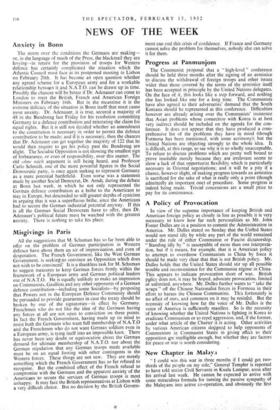Progress at Panmunjom
The Communist proposal that a " high-level " conference should be held three months after the signing of an armistice to discuss the withdrawal of foreign troops and other issues wider than those covered by the terms of the armistice itself has been accepted in principle by the United Nations delegates. On the face of it, this looks like a step forward, and nothing else has looked like one for a long time. The Communists have also agreed to their adversaries' demand that the South Koreans should be represented at this conference. Difficulties however are already arising over the Communists' insistence that Asian problems whose connection with Korea is at best very indirect should be included on the agenda for the con- ference. It does not appear that they have produced a com- prehensive list of the problems they have in mind (though Formosa has been mentioned, with some acrimony); but the United Nations are objecting strongly to the whole idea. It is difficult, at this range, to see why it is so wholly unacceptable. To refuse to discuss problems which are pretty well bound to prove insoluble merely because they are irrelevant seems to show a lack of that opportunist flexibility which is particularly necessary in Oriental negotiations; and it will be a pity if a chance, however slight, of making progress towards an armistice is sacrificed for the sake of what is really only a point (though admittedly in important one) of procedure. Some progress is indeed being made. Trivial concessions are a small price to pay for its continuance.


























 Previous page
Previous page